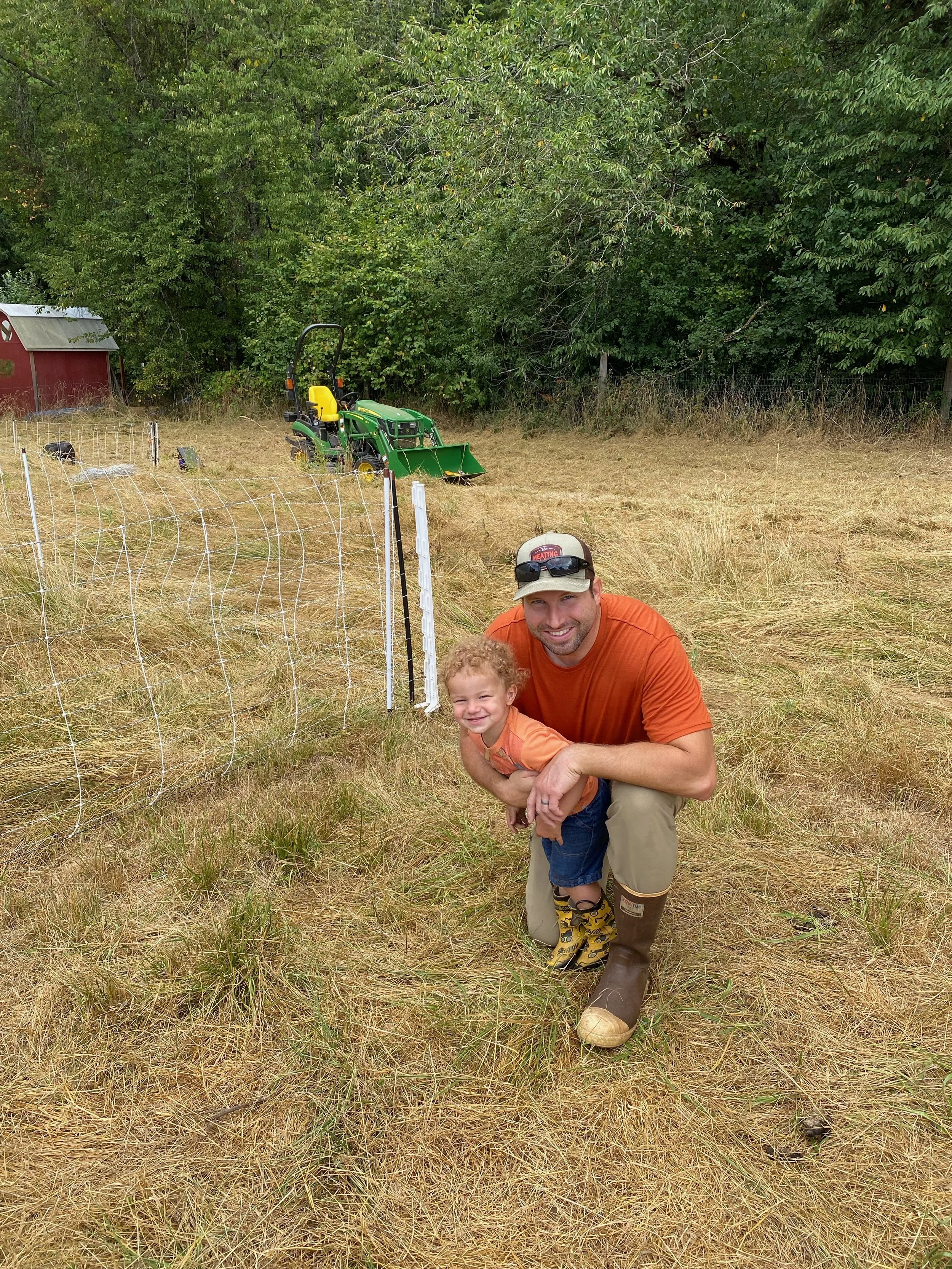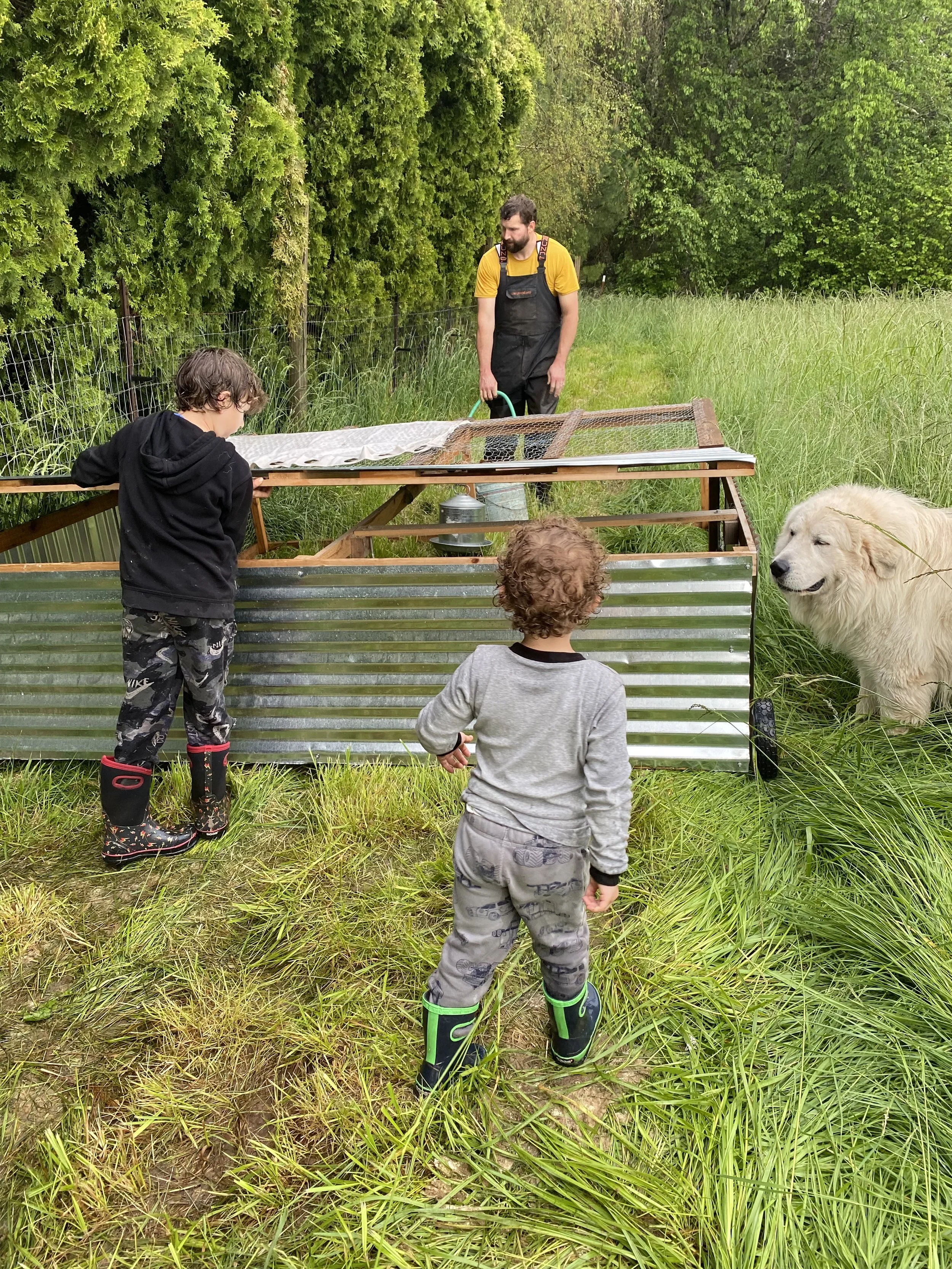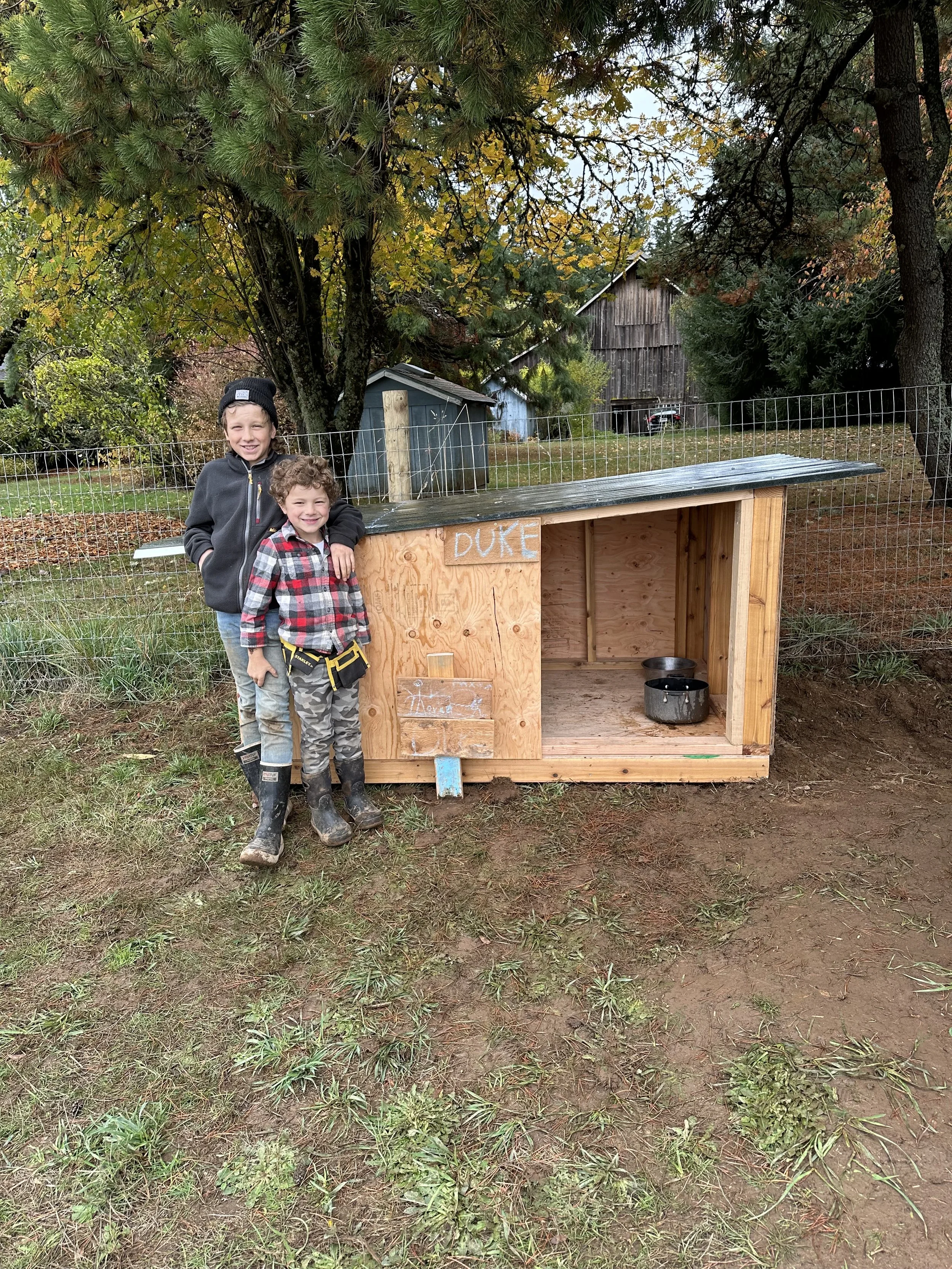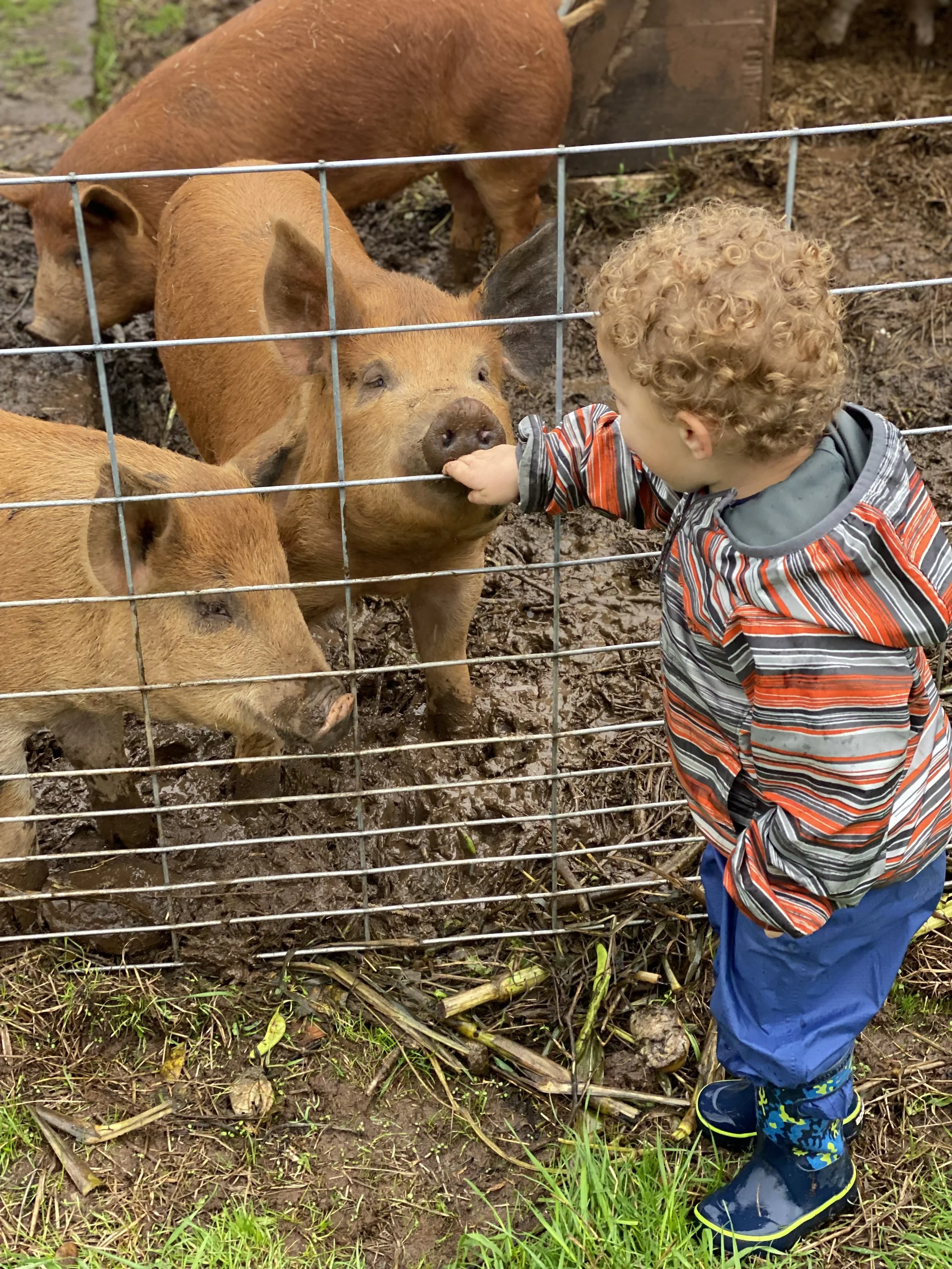Who we are
When we were considering moving from our North Portland bungalow in 2016 there was a definite desire to own a small piece of land to expand what we could grow. At the time we had been managing a couple community garden plots and turned most of our front and back yard into vegetable and fruit production areas. But I wanted to do more food production. So, we started looking and after a year or so we found Sunny Hill Farm. I wrote the current owners a letter about how we loved viewing it and learning about its history. We also wanted to preserve it and raise our growing family here. It was an unusual take compared to other potential buyers looking to tear down and rebuild. Luckily our sentiment matched the owners, and we got it.
I started with chickens in the first year and then quickly expanded to pigs. One taste of these farm fresh products and I was hooked. Meat chickens and lambs quickly followed. I loved the work and sense of responsibility but wasn’t exactly sure the best way to raise animals or create a farm business. I began watching homestead YouTubers and reading books more intently than as just an outside interest and started to experiment. Luckily, I had a handful of generous friends who were happy to buy my products while I figured things out. Today I’m grateful that about 15 different families trust me to produce food for their families.
Farming Philosophy
Providing my family with nutrient-dense food and ensuring the land is healthy and productive year after year is at the heart of everything I do. I lean-on less extractive farming methods that support this goal. Rotational grazing allows animal manure to feed soil microbes which feed the pasture, and the cycle can start again without the use of pesticides or synthetic fertilizers. It’s also been critical for water retention and preventing rock-hard soils in the late Summer which I battled with during the first few years here. Raising animals on-pasture allows them forage opportunities which reduces off-farm feed consumption. Intensively grazing and moving them often to pasture that has been rested also prevents over-grazing and degradation.A
In practical terms, I’m moving poultry and lambs everyday using mobile shelters, electric fencing and portable solar energizers, or both. For pigs, I’m setting up new paddocks every week for their rooting pleasure using electric fencing. All animals have a shelter that keep them out of the rain and snow or shade them from the sun. The pigs utilize a central hub with a shelter that doesn’t move due to its size, but all other animals’ shelters are mobile and move with them to their new paddock. During my daily moves, I’m checking on their supply of feed, water, and supplements and cleaning as needed. When the temperature drops below freezing, I lug out warm water to thaw waterers and throw some extra straw inside shelters.
When buying feed or other supplements I prefer organic and if not organic, local, to support those who are choosing better practices.
About the farmers
After 16 years in the renewable energy industry, I now run the farm and the business largely by myself and with our livestock guardian dog, Duke. Duke is a Great Pyrenees and has been with us for about 6 years. He was trained by the fine folks at Wings and a Prayer farm to be a livestock guardian dog. He is by far the hardest worker on the farm and has been excellent at protecting our chickens and turkeys. With plenty of wooded areas and Forest Park nearby with all manner predators including foxes, coyotes, bobcats, as well as hawks, eagles; and those are just some of the ones we’ve seen. We have lost plenty of chickens over the years but none when Duke is in the same pasture as the birds. At this point Duke stays exclusively with the poultry.
I occasionally get some help from my 12 year old and 5 year old, but not much. If I’m going to put them to work I put them to work in the garden or orchard where there is much more to do anyways. Additionally, we get help from friends to care for the animals when we take a longer vacation.
I got my start in farming at a young age. I grew up in a family that always had a large vegetable garden and a handful of fruit trees. We canned and froze a lot of that food and ate it throughout the year. We also grew tobacco as a cash crop as farms did in the 90s in Kentucky. I worked for nearby farmers in high school and recall putting up hay in barn lofts in heat over 100 degrees and fighting to stay hydrated enough to prevent my forearms from cramping. I always liked physical work and working with my hands but realized quickly that there was little money in it, so I went to school for engineering and got a job in Portland after an internship opportunity. I gave it a good run but always had an interest in farming and homesteading. I continued to follow the space and became very interested in these “new” farming methods that seemed very different than those I grew up with. It eventually led to us getting the farm and when things went well with raising animals, I started to think hard about how I could retire from my job and do this full-time. I’m grateful that my wife has a job and has been willing to support our family financially. We both love the farm and hope to stay here until we no longer maintain it.
Finally, my main partners are Linnton Feed & Seed and The Meating Place. I’m grateful for their services and I couldn’t do this without them.
Life outside of the farm business
Our family spends a large amount of time raising food. It’s hard work. We have a large vegetable garden and a rehabilitated orchard with over 20 trees where most of the vegetables and fruit we eat come from. Some “fun” family activities include spring planting, berry picking, saucing and canning tomatoes, pressing grape and apple juice, pitting and dehydrating plums, picking and shelling beans or corn, plucking sunflower seeds, pumpkin harvest and subsequent jack-o-lantern carving. In short, we are either growing or “putting up” food most of the year. We are extremely proud when we sit down at the table, look around, and notice that most, if not the vast majority, of the ingredients in our meal come from the farm.
I have dreams of turning our orchard into a food forest and I’m hoping that project will accelerate in 2025 with more planting around our existing trees.
In addition, our kids are active in sports and we spend a good amount of weekends in Spring and Summer at baseball games.
Though the days are long and tiring, I’m thankful I get to raise my kids here. There’s so many life lessons that come up. From knowing where your food comes from to knowing how best to work with the land to produce that food, there are countless opportunities to learn and observe. I hope they’ll come away with an appreciation of agriculture and how much good it can do.



